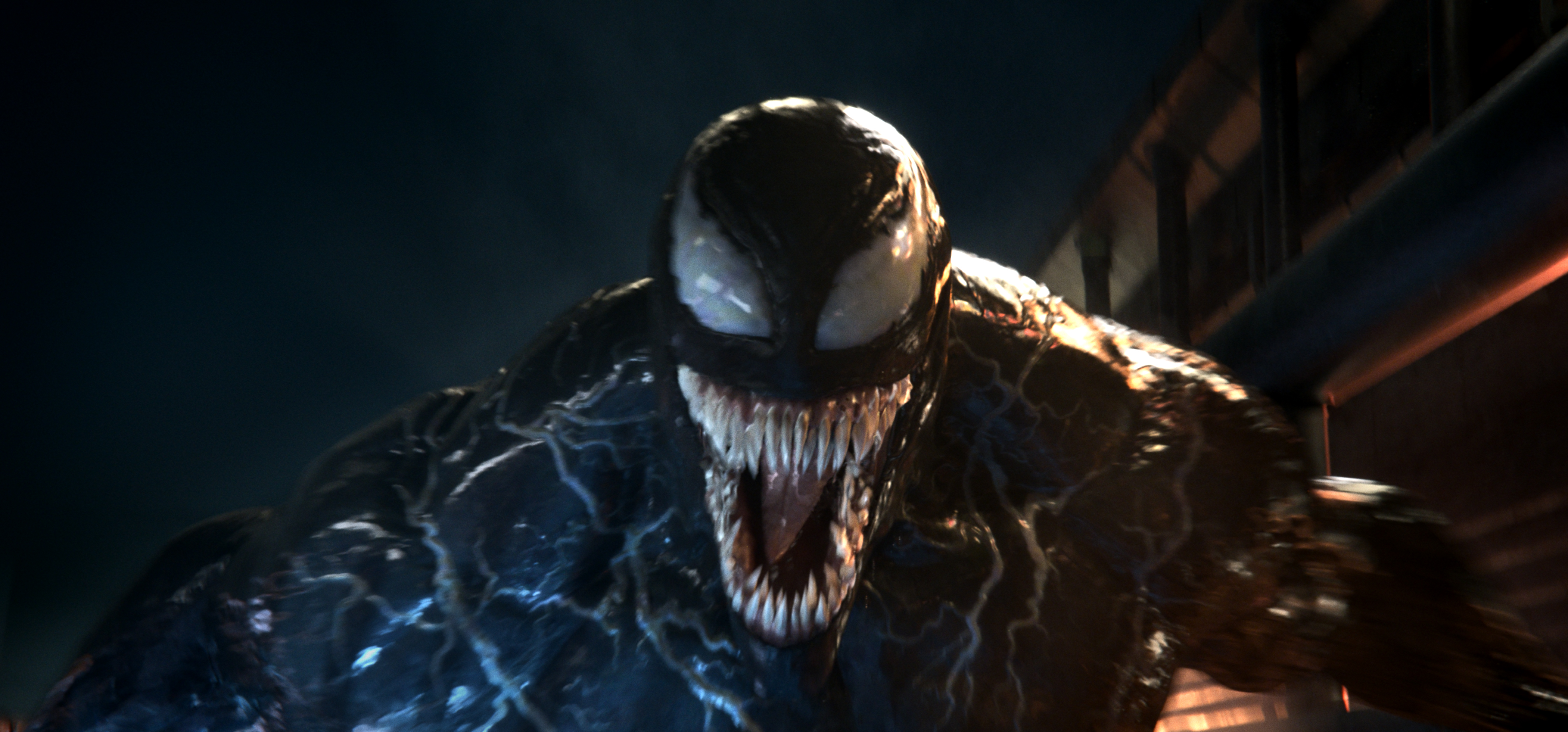Supervillains are making a comeback
But is Venom really the best Hollywood can do?


A free daily email with the biggest news stories of the day – and the best features from TheWeek.com
You are now subscribed
Your newsletter sign-up was successful
Superhero movies are getting into the bad-guy business.
Venom, a new movie starring a fantastical enemy of Spider-Man but not Spider-Man himself, opens in theaters everywhere this weekend. At the same time, a stand-alone movie about longtime Batman nemesis the Joker continues filming and is due for release this time next year. Even this summer's multi-hero extravaganza Avenger: Infinity War found plenty of screentime for its imposing villain Thanos.
This might look like film studios, nearly two decades into a superhero boom, beginning to scrape the bottom of the barrel, turning to villains as they start to run out of novel heroes. But given the number of relative obscurities who have received the big-screen treatment over the past two decades, it's really a wonder that supervillain-centric movies have taken so long to emerge.
The Week
Escape your echo chamber. Get the facts behind the news, plus analysis from multiple perspectives.

Sign up for The Week's Free Newsletters
From our morning news briefing to a weekly Good News Newsletter, get the best of The Week delivered directly to your inbox.
From our morning news briefing to a weekly Good News Newsletter, get the best of The Week delivered directly to your inbox.
The movie supervillain has moved through several phases to arrive at these eventual starring roles. In the 1990s, when the Batman series was basically the only (successful) game in town, it was routine to hire big-name actors like Jack Nicholson, Michelle Pfeiffer, Jim Carrey, and Arnold Schwarzenegger to ham it up opposite a taciturn Batman. Michael Keaton made underplaying into a viable strategy, but later actors were all but swallowed up by their co-stars. Supervillainy was a scene-stealing game, and the rules were to act as colorfully nutty as possible, whether the character called for it or not (hence Tommy Lee Jones turning Two-Face into a poor man's Joker).
In retrospect, one of the major innovations of the early-2000s superhero movies like Spider-Man and X-Men was not just that they took their material relatively seriously, but that they refocused attention on their heroes. Tobey Maguire's Peter Parker and Hugh Jackman's Wolverine feel more emotionally open than later-period Bruce Waynes like Val Kilmer or George Clooney; it's easy to see how they'd become the basis for two beloved ongoing series. At the same time, superheroes' opponents also underwent a humanization. Ian McKellan's Magneto or Alfred Molina's Doctor Octopus have their moments of delicious grandeur, but their madness doesn't radiate evil so much as tragedy. It's no accident that this period of balance produced some of the best superhero movies ever made.
That balance slipped with the advent of Marvel's in-house cinematic universe — specifically with their very first film, starring Robert Downey Jr. as Iron Man. Downey plays the role, especially in that first Iron Man film, with the same blithe, irreverent energy he brought to previous movies (often, not coincidentally, playing bad guys). It was a natural outgrowth of his persona, but in the context of a superhero movie it represented a bigger shift. How many previous onscreen superheroes got better quips than the bad guy? Does the bad guy in Iron Man have any quips? Do you remember who he even is?
Maybe you do; Downey's nemesis is Oscar-winner Jeff Bridges, after all. But this, too, set a template of sorts: Hire a capable actor to play a bad-guy mirror image of the hero, sometimes distorted to look larger and more imposing for a big climactic fight. Hence the long-standing complaint of the Marvel Cinematic Universe's "villain problem." At its best, the MCU has less a paucity of great villains than a surplus of great heroes; is it really a problem that, say, the Captain America movies focus mostly on Captain America? Credit the MCU for realizing a superhero who can hold the screen is more interesting than a villain who can steal it.
A free daily email with the biggest news stories of the day – and the best features from TheWeek.com
That said, it's hard to avoid the house-style sameness of the MCU with such a parade of subpar antagonists; for every Loki, there's the anonymous bad guys of Doctor Strange, Ant-Man, Thor: The Dark World, and Captain America: Civil War. One reason Black Panther and Spider-Man: Homecoming stand out among recent superhero pictures is the strength of their unusually empathetic and shaded villains.
So now that supervillains are making a comeback, how does Spider-Man's old foe Venom fare? Not terribly well, as it turns out, in part because the movie has little interesting for him to do when he's not fighting Spider-Man (as he did, in a previous incarnation, at the climax of 2007's Spider-Man 3). Tom Hardy, playing an investigative journalist who is accidentally fused with a superpowered alien symbiote, gives the material his all, playing up the sweaty, addled side of finding yourself with possibly-deadly superpowers. Seeing the twisty, bulgy Venom face (huge tongue, giant teeth, eerie white eyes) repeatedly envelope Hardy has a horrific, pulpy kick.
But Venom (which was made separately from the MCU-produced Spider-Man series) isn't terribly interested in its character's own dark side. Ultimately, the human-alien hybrid spends more time talking about eating people alive than actually eating them. Fair enough that the movie doesn't overindulge the "extreme" comics culture of the '80s and '90s that birthed Venom in the first place, but on the other hand, who is Venom if not an actual bad guy? Here he's subjected to the old superhero routine, eventually fighting another creature who's a bigger, gnarlier version of our (anti) hero.
Making a movie about a supervillain but relieving the audience of any concern about him doing anything worse than killing anonymous (and murderous) henchmen doesn't undermine superhero formulas. Instead, it turns the narrative into even more of a blatant adolescent power fantasy than most superhero stories. Conceptually, Venom is mostly amoral, and there's only the mildest lip service to the notion that Eddie Brock can actually keep him in check (their eventual Jekyll-and-Hyde relationship is more of a gentleman's agreement). Despite Hardy's sweat, the movie winds up confirming that yeah, being Venom would be pretty cool and fun, as long as he eats who you tell him to eat.
The best supervillains tell us something about ourselves and our heroes. Venom crawls into its hero's head and realizes it has nothing to say.
Jesse Hassenger's film and culture criticism has appeared in The Onion's A.V. Club, Brooklyn Magazine, and Men's Journal online, among others. He lives in Brooklyn, where he also writes fiction, edits textbooks, and helps run SportsAlcohol.com, a pop culture blog and podcast.
-
 Film reviews: ‘Send Help’ and ‘Private Life’
Film reviews: ‘Send Help’ and ‘Private Life’Feature An office doormat is stranded alone with her awful boss and a frazzled therapist turns amateur murder investigator
-
 Movies to watch in February
Movies to watch in Februarythe week recommends Time travelers, multiverse hoppers and an Iraqi parable highlight this month’s offerings during the depths of winter
-
 ICE’s facial scanning is the tip of the surveillance iceberg
ICE’s facial scanning is the tip of the surveillance icebergIN THE SPOTLIGHT Federal troops are increasingly turning to high-tech tracking tools that push the boundaries of personal privacy
-
 Walter Isaacson's 'Elon Musk' can 'scarcely contain its subject'
Walter Isaacson's 'Elon Musk' can 'scarcely contain its subject'The latest biography on the elusive tech mogul is causing a stir among critics
-
 Welcome to the new TheWeek.com!
Welcome to the new TheWeek.com!The Explainer Please allow us to reintroduce ourselves
-
 The Oscars finale was a heartless disaster
The Oscars finale was a heartless disasterThe Explainer A calculated attempt at emotional manipulation goes very wrong
-
 Most awkward awards show ever?
Most awkward awards show ever?The Explainer The best, worst, and most shocking moments from a chaotic Golden Globes
-
 The possible silver lining to the Warner Bros. deal
The possible silver lining to the Warner Bros. dealThe Explainer Could what's terrible for theaters be good for creators?
-
 Jeffrey Wright is the new 'narrator voice'
Jeffrey Wright is the new 'narrator voice'The Explainer Move over, Sam Elliott and Morgan Freeman
-
 This week's literary events are the biggest award shows of 2020
This week's literary events are the biggest award shows of 2020feature So long, Oscar. Hello, Booker.
-
 What She Dies Tomorrow can teach us about our unshakable obsession with mortality
What She Dies Tomorrow can teach us about our unshakable obsession with mortalityThe Explainer This film isn't about the pandemic. But it can help viewers confront their fears about death.
